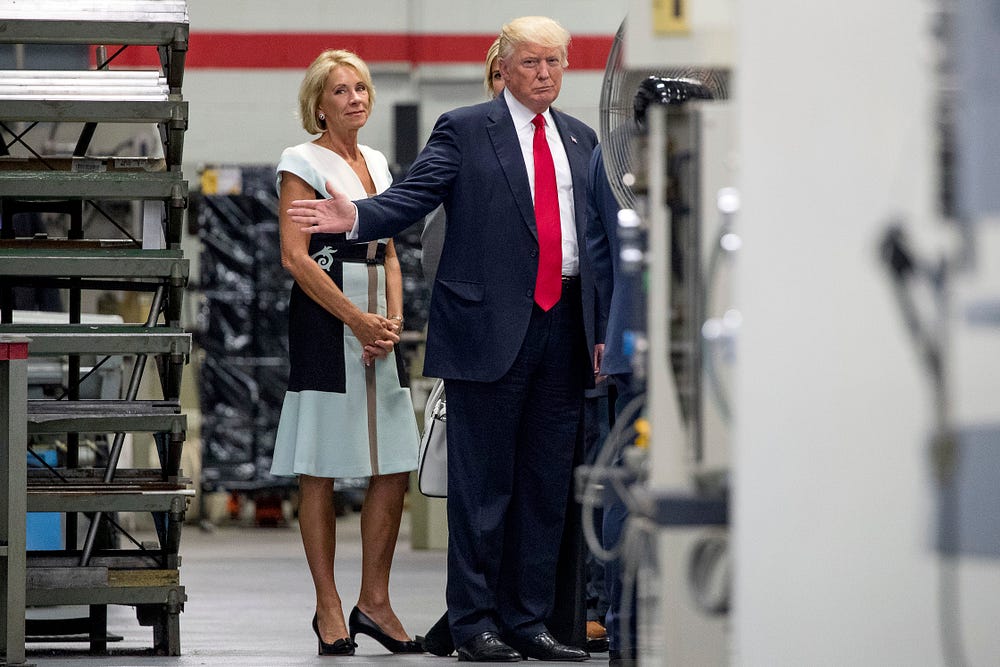88m3
Fast Money & Foreign Objects

Alan Pyke
Deputy Economic Policy Editor, ThinkProgress. Poverty, criminal-justice profiteering, police violence, & robber barons. Tips: apyke@americanprogress.org
Jun 15
Betsy DeVos rolls back regulations holding for-profit colleges accountable
Trump’s team just killed two brand-new rules to protect students — and taxpayers — from scams like Trump University.

Education Secretary Betsy DeVos with President Donald Trump in Wisconsin on Tuesday. CREDIT: AP Photo/Andrew Harnik
Taxpayers and striving would-be students alike lost big on Wednesday. Twice.
The federal government will abandon two signature efforts to hold for-profit colleges accountable to the taxpayers who fund them or the Americans who take out loans to attend their classes, Education Secretary Betsy DeVos announced.
DeVos has canceled a pair of new regulations intended to thwart firms that over-promise and under-deliver on higher education credentials marketed primarily to lower-income adults eager to trade low-wage jobs for long-term careers. The move comes two months after DeVos rescinded another Obama-era policy aimed at protecting student loan borrowers from predatory debt servicers.
One of the now-ended federal policies is known as the “gainful employment rule.” It was hammered out over years of research and compromise, and was finalized in 2014. The policy restricted companies’ access to taxpayer-funded student loan dollars if too few of their graduates ultimately find jobs that pay well enough to allow them to repay their loans. While some critics worried the final rule was too lax, the outgoing Obama team announced that some 800 programs nationwide were failing to meet its standards as of early January.
The other rule DeVos canceled Wednesday is no less important to ensuring for-profit schools aren’t swindling vulnerable people into mountains of needless debt only to leave them with useless degrees. Known as “defense to repayment,” or DTR, the second rule established a formal process for students who believe they were defrauded by an educational company to seek the cancellation of their loans.
DTR remains conceptually grounded in the law itself, meaning DeVos’ regulatory annulment throws wronged students’ lives into chaos but does not permanently deprive them of recourse. The DTR process evolved out of the massive Corinthian Colleges scandal, after multiple state Attorneys General and thousands of self-organized for-profit students who’d been tricked by a now-defunct company went on strike from their debts. They invoked a dusty old piece of law to argue that Corinthian’s victims should not have to repay the Education Department for loans issued in bad faith for a proven scam.
The Inside Story Of How A For-Profit College Hoodwinked Students And Got Away With It
thinkprogress.org
The students initially had to create DTR petition forms themselves, because the government had never actually established how the right to seek debt relief was supposed to work. Thousands of DTR petitions remain unresolved today. DeVos’ agency has tried, without success thus far, to undermine the DTR process in court. By canceling the regulation Wednesday, she threw thousands of ongoing petitions into the wind — effectively scotching the nascent hopes of the many victims of Corinthian’s defunct Everest College brand.
“This means that the vast majority of former for-profit students who are fighting for relief are getting screwed over by the same administration that promised to ‘drain the swamp’ in Washington and look out for working Americans,” organizers from The Debt Collective wrote in a statement on DeVos’ decision. “Mark our words: we will fight today’s decision, in court and elsewhere.”
Politicians in both parties have long supported for-profit college companies in their pursuit of taxpayer dollars, despite substantial evidence that their degrees are of far lesser value than a degree from a traditional higher-education institution.
But the for-profit education business finally had its feathers ruffled a bit in 2016, when the Obama administration grudgingly approved a pair of new regulations. (As The Debt Collective noted in its Wednesday statement, DeVos is only able to disrupt ongoing debt relief work because the Obama team dragged its feet for over a year after Corinthian’s fraud had been laid bare — despite the Education Department itself having proven the case against the company.)
Both DTR and the gainful employment rule came in response to a raft of lawsuits and public pressure to tighten up the government’s grip on student loan dollars. The bipartisan coalition of for-profit boosters in Washington fought hard against even the more basic idea that for-profits must show their graduates were actually finding jobs. But the mountains of evidence that Corinthian, ITT Tech, and other prominent for-profit college brands were charging too much and delivering too little eventually pushed the feds to act.
‘A Pool Of Sharks’: Why For-Profit Colleges Are Descending On Shuttering Corinthian Campuses
thinkprogress.org
DeVos was widely expected to go after the two rules eventually. In the days after President Donald Trump won the November election, the stock prices of publicly-traded for-profit schools leaped in anticipation of just such action. That same week, Trump himself paid $25 million to settle fraud allegations against his own defunct Trump University.
DeVos — a prominent advocate for the privatization of public education dollars at the primary and secondary level for years, and a billionaire born on the economic equivalent of third base — has had a rocky start.
Her confirmation hearings featured shadowy ethical nondisclosures and weird comments about bear attacks on schools. She needed Vice President Mike Pence to cast a tie-breaking vote in the Senate to confirm her nomination. At multiple public appearances since taking office, DeVos has been greeted with boos and protesters.
But while her attempts to engage with students, teachers, and the public have been a rough ride, Wednesday’s moves illustrate the durability of her substantive power as head of the federal educational bureaucracy.
Boo her all you want. When she gets back to the office, she can still open up the taxpayer-funded faucet and play rainmaker for private investors who advertise college-style credentials during re-runs of Jerry Springer and Judge Judy.
https://thinkprogress.org/devos-forprofit-foxes-henhouse-337f4fec3ab4







